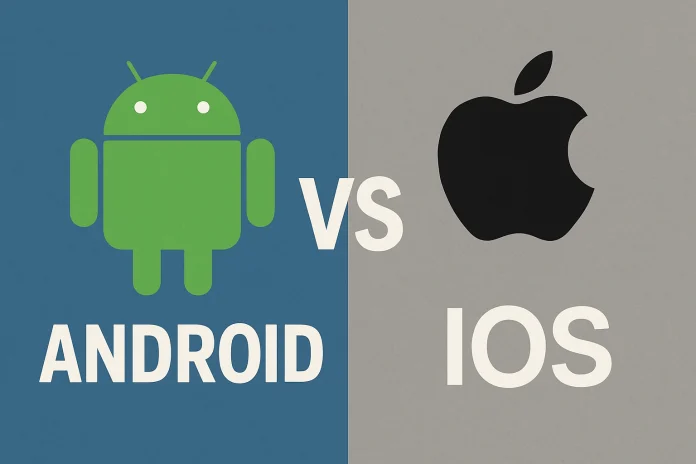Table of Contents
Android vs iOS Security: 7 Powerful Reasons iPhone Wins in 2025
Android vs iOS security isn’t just a buzz-phrase—it’s the battlefield where your personal photos, banking details, and entire digital life are either defended or exposed. If thinking about hackers gives you chills, you’re in the right place. Grab a coffee, and let’s unravel the Android vs iOS security story in plain English.
How We Define Security
For this comparison, security means three things: (1) how quickly flaws get patched, (2) how strictly apps are screened, and (3) how well your data is protected when your phone is locked or lost. Keep that triad in mind as we explore why Android vs iOS security is so hotly debated.
Reason 1 – Swift Software Updates
When Apple releases iOS 18, every supported iPhone—from the latest iPhone 15 Pro Max to the four-year-old iPhone 11—gets the patch the same day. That’s like vaccinating an entire city overnight. By contrast, Android security updates roll out in waves: Google’s Pixel line sees day-one patches, Samsung usually follows within weeks, but some budget models wait months. During that lag, known exploits—like CVE-2024-29747—can roam free.
Reason 2 – App Store Gatekeeping
Apple reviews every submission with both automated scans and human testers, rejecting roughly 1 in 5 apps for policy violations in 2024. Google Play protection is strong yet more permissive, and Android also lets users sideload APKs from anywhere. That flexibility is cool—but according to AV-TEST’s 2024 Mobile Malware Report, 96 % of new mobile malware targets Android.
Reason 3 – End-to-End Data Encryption
Both platforms encrypt data, but Apple’s hardware-tied Secure Enclave means even Apple can’t read your files without the passcode. On most Android flagships, Google’s File-based Encryption (FBE) is excellent, yet cheaper phones sometimes skip hardware-backed keys.
Reason 4 – On-Device Privacy Controls
Starting with iOS 14, every app must ask permission before tracking you across sites. Android 14 has a similar Privacy Dashboard, but enforcement varies by manufacturer skins. When it comes to Android vs iOS security, consistency matters as much as the feature list.
Reason 5 – Hardware Secure Enclaves
Apple’s Secure Enclave and Google’s Titan M2 chip in newer Pixels both isolate biometric data. The difference? Apple ships one SoC across all iPhones, whereas only select Android phones embed comparable chips—again adding variability to Android vs iOS security outcomes.
Reason 6 – Threat Landscape & Malware Stats
According to Verizon’s 2024 Mobile Security Index, the average enterprise saw 50 % fewer iOS incidents than Android. Part of that gap stems from market share, yet the report stresses that OS fragmentation magnifies Android risk.
Reason 7 – User Behavior & Customization
Android is the playground for power users—custom ROMs, system-wide theming, root access. Every tweak widens the attack surface. Meanwhile, iOS’s walled garden may feel restrictive but offers guardrails that novice users rarely jump over.
Practical Security Tips for Any Phone
- Update immediately. Patch Tuesday is your friend.
- Install from official stores only. If you must sideload, verify the APK hash.
- Use a strong passcode and enable biometrics. Four digits are not enough.
- Turn on Find My iPhone / Find My Device. A stolen phone can become a data breach.
- Encrypt backups. iCloud and Google One both support encrypted backups—flip that switch.
- Review permissions monthly. Android’s Privacy Dashboard and iOS’s App Privacy Report are two taps away.
- Use a reputable password manager. Bitwarden and 1Password both offer excellent mobile apps.
Final Verdict
For the average user, iOS still edges out Android on security in 2025. Uniform updates, strict app vetting, and hardware-based encryption create a tighter ship. That said, the Android vs iOS security gap is closing—especially if you choose a Pixel or Samsung flagship and stay disciplined about updates.
FAQ
Is Android really unsafe?
No. Android can be very secure, but it demands more active maintenance—think manual updates and cautious sideloading.
Does jailbreaking/rooting void security?
Yes. Both jailbreaking and rooting disable core OS safeguards. Avoid unless you truly know the risks.
Which platform is better for businesses?
Most enterprises still prefer iOS due to MDM consistency, but Android Enterprise Recommended devices are gaining traction.
References
Looking beyond mobile? See how Microsoft tightened its own defenses in the desktop world by reading our Windows 10 vs Windows 11: 2025 Technical Comparison.

